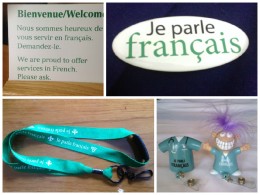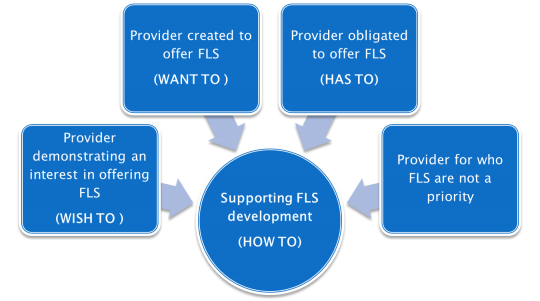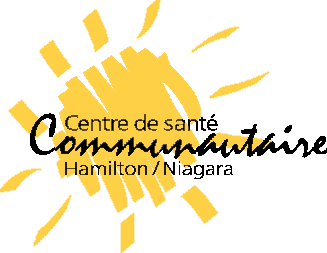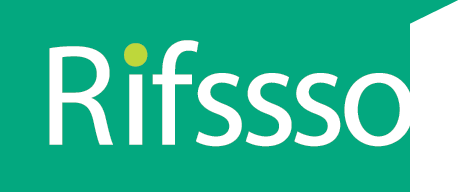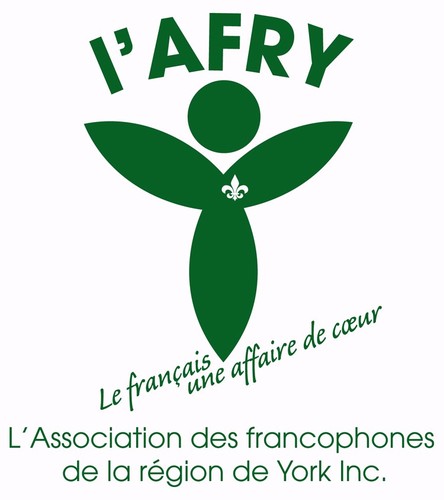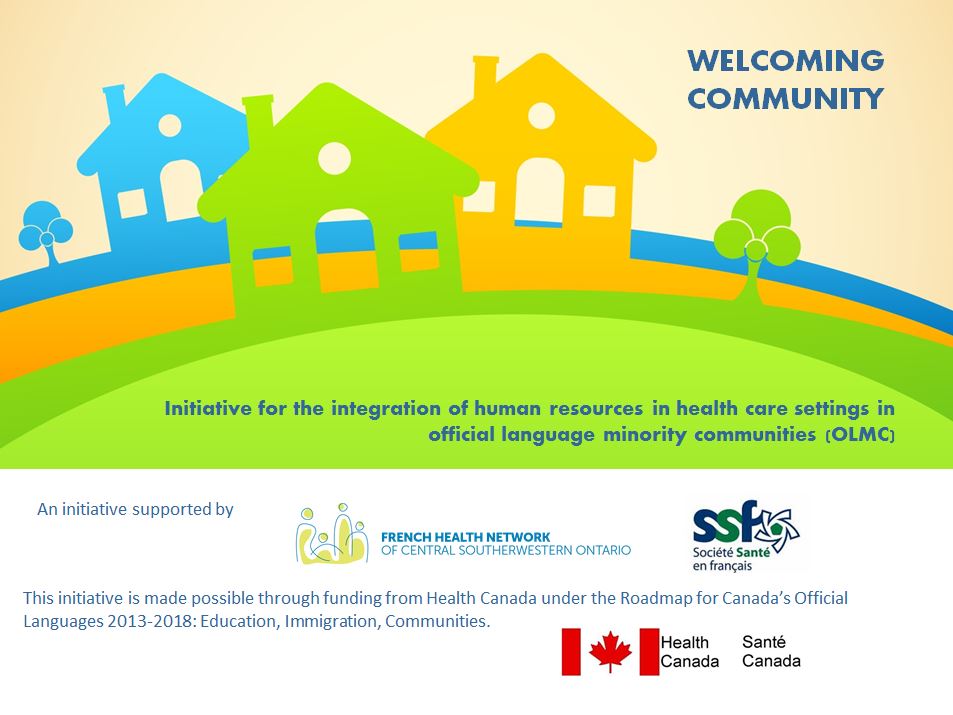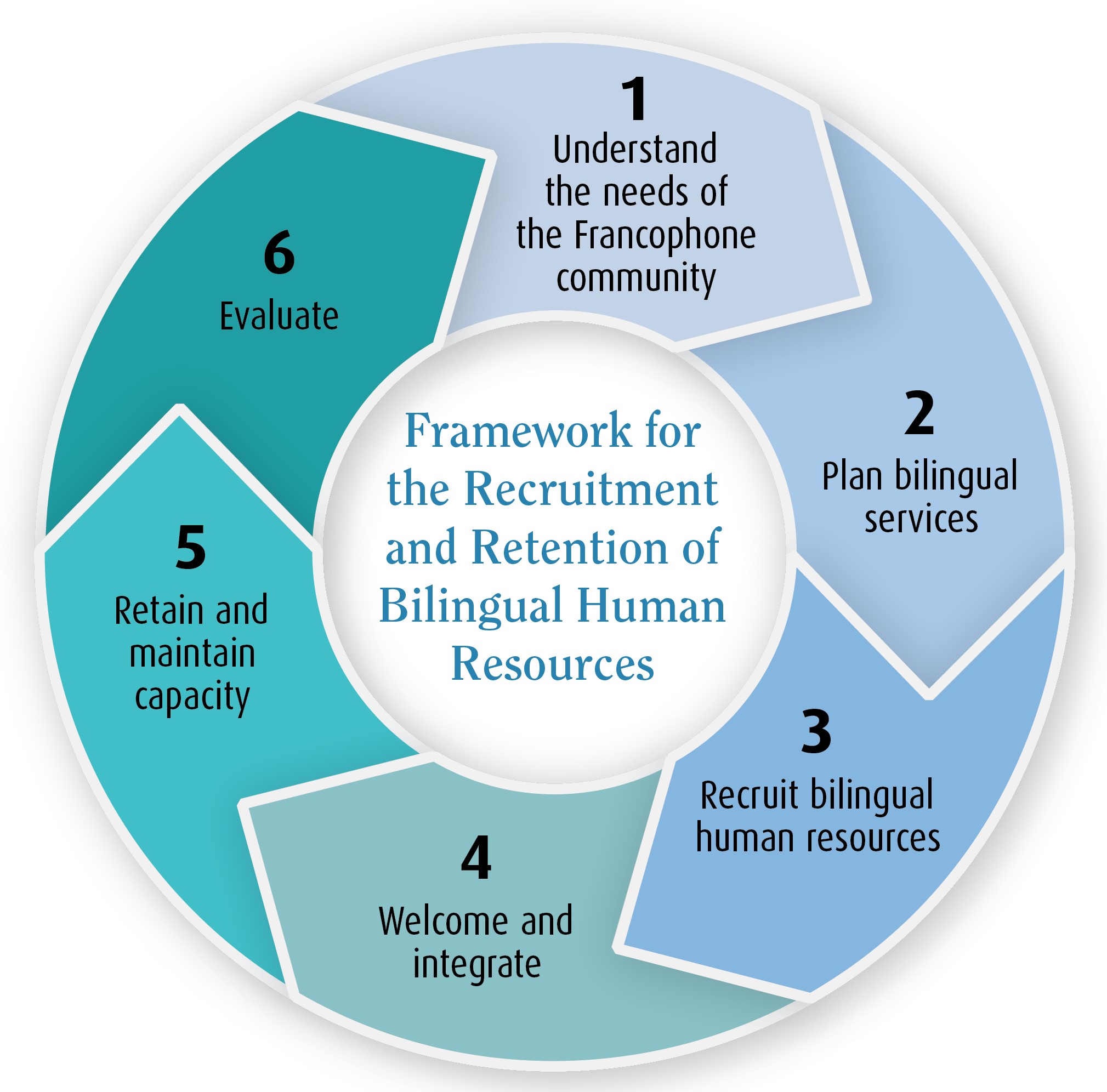6 practical tips for the recrutment & retention of bilingual human resources in the health sector (Spring 2016)
The practical tips offered in this media campaign are base on the Framework for Recruitment & Retention of Bilingual Human Resources in the Health Sector from Société Santé en français et Réseau franco-santé du Sud de l'Ontario, March 2015.

- Best Practices
- Employment/working conditions
- Organizational Level
- Patient Centered
- Professional Level
- Spoken language
Canadian Foundation for Healthcare Improvement (CFHI)
The CFHI has been dedicated to accelerating healthcare improvement in Canada for the last decade. They are a not-for-profit organization with collaborations across the country that include partnerships with researchers, practice leaders and front-line clinical leaders. Since their inception in the late 1990s, they have established a pan-Canadian reach and built an international reputation.
Canadian Subsidy Directory
This directory, updated on a yearly basis, provides access to over 3,000 Canadian sources of subsidies, loans and Government financing programs. This Subsidy Directory is possibly the most complete and up to date publication for anyone seeking financing. Individuals or organizations must pay a registration fee to access the information.
Community engagement
Health Nexus, Your health promotion specialist
Health Nexus produces multi-media resources on a broad range of health promotion topics, both independently and in collaboration with other organizations and experts.
Our tools include how-to guides, best practices, tip sheets and videos—and we can also link you to the latest sources in heath promotion from around the world.
- Health Sources
- Organizational Level
- Professional Level
- Social environments
- Social support networks
- Tools
Consortium national de formation en santé (CNFS)
The CNFS is a Canada-wide umbrella organization bringing together 11 university and college educational institutions which deliver training programs in various health disciplines in French, as well as regional partners who facilitate and promote access to these training programs.
Evaluation of the Official Languages Health Contribution Program 2008-2012
Health Canada and the Public Health Agency of Canada, March 2013
The purpose of the Official Languages Health Contribution Program (OLHCP) evaluation was to assess the relevance and performance of the Program in fulfillment of the requirements of the Financial Administration Act and the Treasury Board Policy on Evaluation (2009). The evaluation covered the period from April 2008 to June 2012.
Funding programs
Centre d'information en resources financières (CIRF), Assemblée de la francophonie de l'Ontario /French only
Complete directory of government and private programs and subsidies available nationally and provincially.
Interventions based on best practices for chronic disease prevention and health promotion
Public health Agency of Canada
- Best Practices
- Education and literacy
- Employment/working conditions
- Health services
- Health Sources
- Income and social status
- Organizational Level
- Patient Centered
- Personal health practices and coping skills
- Physical environments
- Social environments
Je parle français
Get on the right track to diversity and inclusion!
French speaking people are an invisible minority that are not recognized by a last name alone… Let the French speaker come to you.
Clearly place the focus on your bilingual staff using these simple and effective promotional tools. These posters, pins, and promo items have been proven effective by various Ontario organizations working with Francophone Minority Communities.
The models were enhanced in response to trials and recommendations by customers and users in health care settings.
Increase your staffs’ productivity and reduce patient confusion.
Place your order now!
Promo items prices and order sheet jan2015
- Best Practices
- Health services
- Health Sources
- Organizational Level
- Patient Centered
- Spoken language
- Tools
Ontario’s Policy Framework for Child and Youth Mental Health
A Shared Responsibility
As the champion of children and youth, the Ministry of Children and Youth Services (MCYS) has developed a policy framework to provide strategic direction for ongoing improvements over the next decade. The framework applies to all Ontario children and youth up to age 18.
Ministry of Children and Youth Services, November 2006
- Health services
- Health Sources
- Healthy child development
- Organizational Level
- Patient Centered
- Personal health practices and coping skills
- Systemic Level
Project 2008-2013
As part of the call for proposals 2010-2013, $1.4 million was distributed among 12 projets of health promotion for Francophones living in Central-Southwestern Ontario. This funding came out of a $21.5 million funding envelope from Health Canada through the Contribution Program to Improve Access to Health Services for Official Language Minorities, through Société Santé en français (SSF), an umbrella organization of 17 French language health networks. SSF is working to promote the development of healthy French language minority communities across Canada.
In the table below you will find a summary of the projects that have emerged due to the support of this funding. /French only
Tableau-Projets-2010-2013 (in French only)
Project 2013-2018
Human resource strategies for sustaining the continuum of care for francophone populations in central, south-west regions of Ontario.
Project Summary:
A Réseau franco-santé du Sud de l’Ontario’s project conducted between January 25th and March 31st, 2013 in partnership with the Rifssso, the four French Language Health Planning Entities (Entities) and the collaboration of the Local Health Integration Networks (LHINs) of the region and with the support of Sultrem Inc. consulting firm.
Expected results:
A collaborative project contributing to increase the knowledge baseline and provide a framework for targeted actions in the area of FLS. Findings and observations are based on front line service provider data captured via surveys and interviews.
Regroupement des intervenantes et intervenants francophones en santé et en services sociaux de l’Ontario (Rifssso)
Le Regroupement des intervenants francophones en santé et en services sociaux de l’Ontario (Rifssso) is a not-for-profit umbrella organization of French-speaking professionals working in the fields of health and social services. Its goal is to develop and support leadership among its members by offering them a variety of activities such as continuing professional development, networking, and so forth. In addition, Rifssso works to raise awareness within government of the challenges facing French-speaking professionals working in these fields.
THE IMPACT OF LANGUAGE BARRIERS ON PATIENT SAFETY AND QUALITY OF CARE
Final Report

Prepared by: Sarah Bowen, PhD
For: Société Santé en français
August, 2015.
KEY POINTS
1. Significant research has been conducted on the impact of language barriers on health and healthcare, particularly over the past two decades. This research, (and several sys-tematic and critical reviews) has provided compelling evidence of the negative impact of language barriers on healthcare access, patient satisfaction and experience, as well as disparities in receipt of care between English (dominant language) proficient patients and those facing language barriers.
2. Those facing language barriers also face increased risk of medication errors and com-plications, and adverse events. The rights of limited English proficient patients to in-formed consent and confidentiality are often not protected.
3. The research on language access does not align that well with the healthcare quality and safety literature; and not all applicable research is published in commonly-cited medical journals. This may contribute to low awareness of the risks of language barriers among providers and managers.
4. Due to data limitations, limited research on impacts of language barriers has been con-ducted in the Canadian setting. However, a review of the pathways through which lan-guage barriers impact quality of care and safety indicates that much of the international research is applicable in the Canadian context.
5. In contrast to the evidence of negative impacts of language barriers on quality of care (including risk of adverse events), there is not evidence of disparities in mortality be-tween English proficient patients and those facing language barriers. This finding is not unexpected, given what is known about the pathways by which language barriers affect care quality, and limitations of methods used to investigate the impact of language barri-ers on health outcomes.
6. There are several barriers to action in addressing the risks of language barriers to quali-ty of care and patient safety: lack of awareness of current research; gaps in Canadian research; lack of language coding in Canadian data; historical framing of linguistic ac-cess as an issue of cultural sensitivity (rather than patient safety); and failure to ade-quately “translate” available evidence into healthcare action.
7. Recent research has begun to outline the complexity of pathways by which language, culture, race/ethnicity and health literacy may affect patient care.
8. Current approaches to addressing the risks of language barriers rely on the dedication and insight of individual providers rather than implementation of effective, evidence-informed strategies at the system level. This is not acceptable in light of current knowledge of effective approaches to patient safety.
9. Implications of available evidence for future research, for the SSF, and for the patient safety movement are discussed.
- Health services
- Health Sources
- Organizational Level
- Patient Centered
- Personal health practices and coping skills
- Professional Level
- Spoken language
- Statistics and Research
The Welcoming Community Project
 A community-support strategy aimed at recruiting, integrating and retaining bilingual health professionals in minority settings.
A community-support strategy aimed at recruiting, integrating and retaining bilingual health professionals in minority settings.
Based on the national strategic orientation set forth by la Société Santé en Français for 2014-2018 and the 16 French-language health networks.
Respond to two of the recommendations from the Evaluation of the Official languages Health Contribution Program 2008-2012.
Support strategies for:
COLLEGES AND UNIVERSITIES
Support identification of students registered in health programs who have a Francophone or bilingual secondary school graduation diploma.
Contribute to the trainee placement and community engagement efforts of health programs for Francophone and Francophile students in the four regions.
HEALTH SERVICE PROVIDERS
Encourage health service providers to approach postsecondary institutions and inform them of their requirements with regard to bilingual and Francophone trainees.
FRANCOPHONE COMMUNITIES
Help the regions promote the importance of supporting Francophone and bilingual trainees as a long-term method
of meeting the challenge of recruiting and retaining bilingual human resources
Establish reception services at the four host agencies and market them to Francophone and bilingual students in college and university level health programs in order to promote and facilitate trainee placements in the four regions.
TARGETED CAREERS
The welcoming community project targets the following professions where there is an urgent need of French professionals according to Health Canada's survey.
Nursing
Social work
Physicians
Psychology
Speech therapy
WELCOMING COMMUNITIES IN SOUTHERN ONTARIO
Region 1: Erie St. Clair / South-West region
Centre communautaire régional de London
Founded in 1990 the CCRL is a dynamic, inclusive and unavoidable center and francophone hub.
www.ccrlondon.on.ca
Contact: Adeline Le Roy, Coordinator, [email protected] , 519 673-1977 poste 3858
Welcoming activities
•Support, enrich and promote French language as well as French-Canadian and Francophone culture in the heart of London area.
•Develop and offer activities and social-cultural programs in French for a real social and community development.
•Encourage consultation and community cohesion to meet the needs of Francophones and Francophiles from various cultures and backgrounds.
Foster a welcoming community and a community engagement for all Francophones and Francophiles in the region.
Region 2:Waterloo/ Wellington and Hamilton, Niagara Haldimand Brant Regions
Centre de santé communautaire Hamilton/Niagara
Recognised provincially as a leader in making health services available to the French speaking population and to those wishing to have access to French services.
www.cschn.ca
Contact:Rachelle Anderson, Volunteer Resources Administrator, [email protected]
Welcoming strategies
•Establishing a central access point to meeting students, and community needs;
•Offering assistance to find housing;
•Helping with finding and accessing all services in the region;
•Coordinating educational field trips to discover the region;
•Connecting to social and professional regional networking;
•Introducing to French and bilingual organizations within the region;
•Promoting a sense of belonging through various activities.
Region 3:Greater Toronto Region
Le Regroupement des intervenants francophones en santé et en services sociaux de l’Ontario (Rifssso)
A dynamic network assisting professionals and volunteers in the health and social service fields and supporting the community in all its diversity.
Contact: Christiane Fontaine, Executive Director, [email protected] , 1 800 265-4399
Welcoming strategies
•Assembling and distributing "Welcome Kits" containing information on: existing services, active community groups and regional resources;
•Offering assistance for easier integration;
•Avoiding isolation by encouraging students participation in French activities, whether social, artistic, cultural or professional;
•Creating a matching-body system with members of the intervening staff to validate and/or evaluate the acquired academic knowledge and the work done during their internship;
Region 4: York Region and its surrounding
Association des francophones de la région de York Inc. (AFRY)
An organization with the mission of getting the French and Francophile Community to flourish by promoting a larger access to quality French services in its region.
Contact: Marie Martel, Coordinator, [email protected], 905-727-4631 extension 76550
Welcoming strategies
•Assembling and distributing community information kits
•Organize meet and greets (breakfasts, coffee, dinners)
•Offer students opportunities and venues to present their internship project or to describe their experience within the French community. Their French exposés could be presented in schools or at career fairs, etc.
Trillium Foundation
The Trillium foundation encourages the development of healthy and dynamic communities in Ontario, by investing in community initiatives that strengthen the capacity of the volunteer sector. Deadlines for requesting funds from the community program and the provincial program are March 1st, July 1st and November 1st.
- Funding
- Health Sources
- Organizational Level
- Personal health practices and coping skills
- Social environments
VIDEOS ON THE ACTIVE OFFER OF FRENCH LANGUAGE HEALTH SERVICES
Le Réseau du mieux-être francophone du Nord de l’Ontario (RMEFNO)
This new tool, created with funding from Health Canada through an important partnership with Société Santé en français, is designed primarily for health care professionals and providers. It aims to raise awareness regarding the importance of proactively offering quality services in French to health care recipients.
Active Offer Introduction from Shebafilms Kelly Saxberg on Vimeo.
- Health services
- Health Sources
- Organizational Level
- Patient Centered
- Professional Level
- Spoken language
Active Offer of French Language Health Services in Ontario
Joint Position Statement on the Active Offer of French Language Health Services in Ontario The Regroupement des Entités de planification des services de santé en français de l’Ontario and the Alliance des Réseaux ontariens de santé en français March 2015Health Human Resources Strategy
The concepts and courses of action presented here are aimed at increasing French language health services across Canada. This online resource provides a framework for recruitment and retention of bilingual human resources in the context of health services for a minority population.
